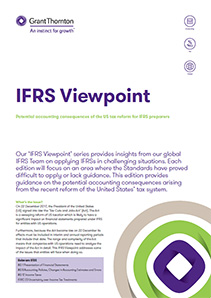-
Corporate Finance and Deal Advisory
We offer a dedicated team of experienced individuals with a focus on successfully executing transactions for corporates and financial institutions. We offer an integrated approach, with our corporate finance specialists working seamlessly with tax and other specialists to ensure that every angle is covered.
-
Digital Risk
Grant Thornton offers solutions to the digital risk issues you are sure to face. Our skilled and experienced security team can helping by advising and consulting, giving you peace of mind, clear value for money and an enhanced ability to react to attacks.
-
Technology Consulting
Motivating and assisting our clients to pursue, maintain and secure the benefits of digital solutions is at the core of our Digital Transformation teams' agenda and goals. We work with business leaders to deliver efficient digital strategies and operating models that provide new or enhanced capabilities.
-
Economic Advisory
Our all-island Economics Advisory team combines expertise in economics and business with a wealth of experience across the public and private sectors.
-
Forensic Accounting
We have a different way of doing business by delivering real insight through a combination of technical rigour, commercial experience and intuitive judgment. We take pride in delivering responsive and tailored solutions to all our clients, capitalising on the wealth of experience housed within our Belfast and wider Forensics team
-
People and Change Consulting
The Grant Thornton People & Change Consulting practice works with clients on these issues as well as on all aspects of how they attract, retain, engage develop, deploy and lead their people.
-
Restructuring
We work with a wide variety of clients and stakeholders such as high street banks, private equity funds, directors, government agencies and creditors to implement solutions which provide the best possible outcomes.
-
Corporate and International Tax
Northern Ireland businesses face further challenges as they operate in the only part of the UK that has a land border with a country offering a lower tax rate.
-
Employer Solutions
Our team specialises in remuneration and incentive planning and works closely with employers, shareholders and employees to ensure that business strategies are aligned and goals achieved in the most tax efficient, cost-effective manner.
-
Entrepreneur and Private Client Taxes
Our team of experienced advisors are on hand to guide you through any decision or transaction ranging from the establishment of new business ventures, to realising value on exit, to succession planning and providing for loved ones.
-
Global Mobility Services
Grant Thornton offer a different approach to managing global mobility. We have brought together specialists from our tax, global payroll, people and change and financial accounting teams across Ireland and Northern Ireland, while drawing on the knowledge and insights of our global network of over 143 offices of mobility professionals to provide you with a holistic approach to managing global mobility.
-
Outsourced Payroll
Our outsourced service provides valued service to over 150 separate PAYE schemes. These ranging from 1 to 1000 employees, working for micro, SME and global employers. The service is supported by the integrated network of tax and global mobility teams and the wider Grant Thornton network delivering a seamless service. Experienced staff deliver a personal service built around your business needs.
-
Tax Disputes and Investigations
Our Tax Disputes and Investigation team is made up of tax experts and former HMRC investigators who have years of experience in dealing with a variety of tax investigations. Our expertise and insight can guide you through all interactions, keeping your cost at a minimum while allowing you to continue with the day to day running of your business.
-
VAT and Indirect Taxes
At Grant Thornton (NI) LLP, our team helps Northern Ireland businesses manage their UK and global indirect tax risks which, as transactional taxes, can quickly become big liabilities.
On 22 December 2017, the President of the United States signed into law what is commonly known as the ‘Tax Cuts and Jobs Act’. The Act is the most comprehensive reform of US taxation since 1986 and makes sweeping changes to both individual and corporate taxation.
Foremost among the changes is the reduction in the US corporate tax rate from 35% to 21%. There are however a number of other changes which are aimed at encouraging economic growth and reducing the incentives for US companies to shift their tax base to low- or no-tax jurisdictions.
We discuss a number of these areas in our publication and set out our views on the financial reporting issues arising from them.
The Act is a complex piece of legislation and IFRS preparers with operations in the US will need to spend a considerable amount of time analysing it in order to understand how it may impact accounting for income taxes in their financial statements.
Furthermore, because the Act became law on 22 December its effects must be included in interim and annual reporting periods that include that date. With many companies preparing financial statements for annual reporting periods ended
31 December 2017, this could have a potentially material impact due to both the complexity of the Act and the difficulty of gathering information in relation to some aspects of it.


